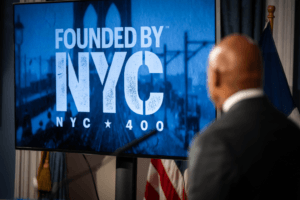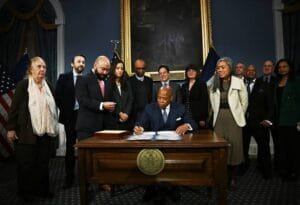NY Mayor launches food access programs to cater for victims of Covid-19 pandemic

The Mayor of New York city, Bill de Blasio, has announced a food access program, an initiative that caters for neighborhoods that have suffered disproportionately during the COVID-19 pandemic.
While disclosing this on on Sunday August 16, 2020, Blasio stated that New Yorkers in communities of color would have easier access to nutritious, high-quality foods with meal deliveries, online grocery shopping and more.
According to the Mayor, every New Yorker should have equitable access to healthy food.
“These programs will help families get nutritious foods without having to sacrifice spending on other critical needs,” Blasio said.
The Mayor added that the city’s new normal of sheltering in and social distancing have shuttered thousands of businesses.
While speaking about the initiative, First Lady Chirlane McCray said that the wages lost have left New Yorkers, many for the first time, experiencing hunger, especially in communities of color that have suffered disproportionately during the pandemic.
These food programs will help fill a critical gap in the neighborhoods we are serving by making more healthy meal options available,” she said.
She said that the Taskforce works to ensure that COVID-19 response and recovery efforts are tailored to meet the specific needs of New Yorkers in communities of color.
McCray added that city agencies conducted a survey with community members and the feedback helped to inform the issue areas of the taskforce’s work.
“Communities across New York City – and communities of color in particular – deserve access to fresh, healthy, and affordable food, and need it now more than ever,” said Anusha Venkataraman, co-chair of the Taskforce subcommittee on Food Access & Insecurity and NYC Chief Service Officer.
“I am proud of the Taskforce’s work to expand and improve these important initiatives, and support local businesses in the process.
“Moreover, these options will help expand choice, including to culturally appropriate foods, so that New Yorkers can choose which foods they want to eat and feed their families,” Anusha added.
Part of the initiative is online shopping with independent grocers.
New Yorkers have faced new hurdles in accessing groceries during the pandemic.
Many seniors and immunocompromised individuals cannot risk exposure to COVID-19 by leaving their homes, and some large grocery providers that offer online shopping and delivery are operating at capacity, which has resulted in significantly delayed deliveries.
At the same time, supermarkets that do not currently offer online ordering and grocery delivery may not have the resources to begin offering these services during the pandemic, leading some seniors and immunocompromised
New Yorkers who have not been able to access grocery delivery, to turn to the City’s food banks and pantries.
Starting this summer, the City will partner with Mercato an online marketplace founded by a Brooklynite to increase the amount of home delivery services available, and support independent grocery stores in hardest-hit communities.
The company facilitates delivery for 225+ specialty shops across the city, including Zabar’s, Eataly, and Chelsea Market.
The City’s arrangement with Mercato will allow customers to order from several vendors at once within each neighborhood, replicating the experience of shopping from store to store in person.
The pilot program includes 35 independent supermarkets in the hardest-hit neighborhoods including those in Queens and Staten Island along with participating vendors from the Economic Development Corporation’s (EDC) Public Markets network.
Last year, the City launched Get the Good Stuff, NYC’s first grocery store-based fruit and vegetable incentive program for New Yorkers who receive Supplemental Nutrition Assistance Program (SNAP) benefits.
Since June 2019, over 5,300 New Yorkers with SNAP have enrolled in the program and have redeemed more than $430,000 worth of fruit and vegetable incentives.
Starting this year, the program will expand to additional stores located in communities hardest hit by the COVID-19 pandemic and target New Yorkers with low incomes who do not participate in food assistance through SNAP.
Managed by the Department of Health and Mental Hygiene (DOHMH), the program will partner with community-based organizations such as food pantries, healthcare providers, and social service organizations to enroll participants and issue Get the Good Stuff cards.
Participants will swipe the cards at a nearby partner grocery store to receive a dollar for dollar match on purchases of eligible fruits, vegetables and beans.
For every $1 spent on eligible foods, participants will get $1 added to the card to spend on more eligible foods next time. Participants can accrue up to $10 in incentives per day.
The program will recruit five independently-owned grocery stores to implement the expansion.
Criteria for the selection of stores will include location in priority neighborhoods that have high rates of COVID related burden.
To be eligible, stores must sell a wide variety of culturally-appropriate fruits and vegetables and contract with an approved point of sales vendor for system support.
Get the Good Stuff is the latest in a series of fruit and vegetable incentives by DOHMH for people who use SNAP.
In 2005, the Health Department launched Health Bucks, one of the nation’s first fruit and vegetable incentive programs. Over the last 15 years, New Yorkers have used Health Bucks to purchase more than $6 million worth of fresh fruits and vegetables. The program is now available at over 115 New York City farmers markets.
The NYCHA Food Business Pathways (FBP) and Catering Business Pathways programs have supported more than 300 NYCHA residents to start or grow their food businesses.
The Growing NYCHA Food Entrepreneurs initiative provides meal delivery to NYCHA residents with gas outages while also connecting NYCHApreneurs (NYCHA Entrepreneurs) who have graduated from the Business Pathway programs with opportunities in the emergency food market.
The program, as currently supported, will be scaled with additional commitment from the City for meal purchases from participating NYCHA vendors for an additional 13,440 meals, providing NYCHA residents with quality, culturally appropriate meals while supporting NYCHA resident-owned businesses.
This business capacity building support will help enable resident-owned food businesses to become more competitive in securing city contracts, participating in the city’s emergency feeding programs, and partnering with CBO-based hunger programs.
The City will reduce operational requirements for the Emergency Food Assistance Program (EFAP) from 6 months to 4 months to allow more food pantries and soup kitchens in high-need communities to participate and expedite emergency distribution to additional locations.
This will enable an additional 100 to 200 food pantries and soup kitchens in the hardest-hit neighborhoods to enroll.
Additionally, this fall, information about Grab & Go meal sites will be distributed to New Yorkers in these neighborhoods through targeted marketing and community outreach.
The City will also work to identify external partners to host Grab & Go meals. New Yorkers can call 311 for more information.
“COVID-19 has resulted in unprecedented level of food insecurity across the City.
“These programs will make it easier for New Yorkers to access healthy foods from their local grocers and food pantries at a time when it’s sorely needed.
“I commend the Taskforce for centering food in their recommendations to address gaps in equity,” said Kate MacKenzie, Director of the Mayor’s Office of Food Policy.
According to James Patchett, President and CEO of New York City Economic Development Corporation, putting equity at the center of the City’s recovery means ensuring New Yorkers have access to quality food that is healthy and affordable.
“The partnership with Mercato gives seniors and other groups at a higher-risk for COVID-19 a safer means to access food.
“At the same time, independent grocery stores and participating vendors at our public markets, which are serving hard-hit communities, can grow their business by building their digital presence.
“This effort, which invests in both people and local businesses, will create a stronger New York for all,” Pratchett said.
“During this pandemic, we’ve fought so hard to protect our city’s health,” said Dr. Dave Chokshi, Commissioner of the New York City Department of Health & Mental Hygiene.
“Nutrition is a core component of health and expanding ways for New Yorkers to get nourishing food is essential,” he added.
“No one should be without access to nutritious food, and these additional 13,440 meals will help many of our most vulnerable residents, while also providing the first-hand City contracting experience resident-owned food businesses need to get ahead,” said Greg Russ, NYCHA Chair & CEO.
“We are all in this crisis together, but the fact is, it doesn’t affect everyone equally. Some communities have been hit far harder, and racial equity must be at the forefront of our response.
“As the City’s COVID-19 Food Czar, I’ve worked to bring fresh produce to underserved communities, work that these announcements will help support.
“This will mean a fairer, healthier, more just New York,” said Kathryn Garcia, Commissioner of the New York City Department of Sanitation.
“Hunger is an emerging epidemic in communities impacted by the COVID-19 outbreak.
“The Taskforce’s response will bring healthy food to the New Yorkers who need it most,” said Assembly Member Mathylde Frontus.
“I commend Mayor de Blasio for this inspiring initiative recognizing the public’s need for food resources and security.
“The Get the Good Stuff Expansion, NYCHA Food, Emergency Food Assistance and Grab and Go Meals” are essential to the neighborhoods that are hardest hit by the pandemic and will assure the public’s wellness,” said Assembly Member Rebecca Seawright.
“In the greatest city in the world, and in the midst of these profoundly difficult economic times, we cannot be idle while one in eight of our New Yorkers face food insecurity,” said Council Member Paul Vallone, who serves as chair of the Committee on Economic Development.
“Improving access to healthy foods in neighborhoods hardest hit by the COVID-19 pandemic is a critical step in developing the equitable and transformative food policy strategies of tomorrow.
“I thank NYC EDC and the Mayor’s Administration for highlighting this important issue and implementing this impactful initiative in partnership with Mercato.”
“We have seen that access to any food, and fresh food in particular, has been one of the biggest challenges amplified by this pandemic.
“I am pleased to see the administration taking these creative steps to ensure New Yorkers don’t go hungry,” said Manhattan Borough President Gale A. Brewer.
“We applaud the Mayor’s team for their expansion of the Get the Good Stuff initiative to bring affordable fruits and vegetables to the communities that have suffered most from COVID-19.
“A healthy diet rich in plants is the key to preventing, treating, and even reversing many chronic diseases, which can in turn dramatically decrease the risk of severe COVID infection.
“We are proud to support this major step in ensuring greater access to fruits and vegetables in low-income communities and reducing health disparities,” said Brooklyn Borough President Eric Adams.











